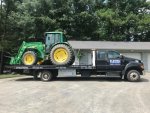I didn't start the conversation to have a he said, she said discussion. I started the thread because of the 'fact' that pre 4 tractors are holding or appreciating in value because of the Tier 4 mandate and how it's impacting the used tractor market and it's more in the larger units (75 and up PTO) which are mostly farming units.
I'm not by any means clairvoyant but I was lucky to find and buy a used M9 last spring and got it for a really good price. Needed a bit of work (which I expected because I'm anal about my tractors anyway) but, they don't exist used today and if they do, the asking prices are through the roof because of the T4 Mandate, whicn not only makes the used one I bought worth more but the cab 9 I bought new in 2004 worth more as well.
Not that I'm gonna sell either one because I'm not (unless someone offers me some crazy price), then I might but it is comforting to know that when the time comes and I'm done farming or have passed, my wife can realize a good buck from them.
Far as people who don't have one whining about the T4 units, that isn't what I see at all. Every horror story I read about is from owners of various brands that are having issues. Have not read one missive about them that wasn't from an owner, maybe I read the wrong stuff. I read comments on Hay Talk, here and TBYNet.
Far as modifying / deleting a T4 tractor or vehicle for that matter, the law speaks for itself. No comment needed. People like to fiddle, human nature but fiddling with emissions related components or ROPS for that matter has a price and that price is liability down the road. If you plan on keeping a unit forever and getting buried with it, no issue. There is an issue when you trade it in or sell it under false pretenses and that issue is, the liability for deletion or modification of components rests solely on you if you made those modifications.
I go back to the ROPS thread where the poster said "it's mine, I'll do what I want with it". I have no issue with that, it is yours, you paid for it so you can. However, if and when you sell or trade it in, the liability issues rests with you and you alone and trading it in under false pretenses is just plain wrong.
Like my friend who has the 50+ Mack road tractors and deleted every one. He full well knows what the ramifications are, he is, after all an authorized Mack dealer and why ever tractor he deletes for his trucking company, he retains all the deleted parts because he understands the 'down the road liability' and so he returns the units to compliance prior to selling them.
The Eric guy on TBYNet talking about modifying the ECM and removing sensors and the element and doing this and that to circumvent the T4 components, all well and good but Eric had better never need any dealer service because his unit becomes a black sheep and no dealer will service it. I hope he understands that modifying the ECM will render it unusable as far as a compliant component and he will have to buy a spare ECM as well. Eric better have a big wallet....lol
My dealer (Carleton Farm Supply) who I do all my business with, the owner, Keith told me the biggest reason buyers he sells to (He's a Kubota authorized dealer) have T4 issues is... They don't bother to read the owners manuals and follow the Kubota recommended procedures for allowing the DPF to regenerate properly or using the regen button to over ride the process and then the DPF loads up, the motor derates (or won't even start) and the tractor goes back for a sometimes costly service. Keith told me it's the first question he asks an owner 'did you follow the directions outlined in the owners manual'? Told me the answer is usually...duh...

I don't have any idea what Kubota covers as far as emissions related issues. I do know that by Federal mandate, emissions components have to be covered for 5 tears from the date of purchase but I presume that is about component failure, not owner abuse because they never bothered to follow the Kubota recommended procedures. Never got into that aspect in the conversation.
Personally speaking, I don't want a T4 tractor anyway because of the complexity of the components and I never cared for electronically controlled engines or fuel systems because I cannot fix them in the barnyard or in the field. I want a mechanically injected non emissions unit, because I can fix them.
Like my car. it's a fuel injected 49 state legal gasoline direct injection engine and you can bet I have an extended factory warranty with towing and rental car on it because I know if it breaks, I'm screwed. Towing and rental don't work with tractors. You may get a loaner if your dealer has one, maybe not and I've never seen a tow truck towing a tractor yet.
My farm truck is a diesel and in keeping with my philosophy, it's a pre 4 engine as well, because, again, I can work on it.
I'm old enough where I'll never be subject to a post 4 diesel engine, my pre 4 engines will outlast me and I'm good with that. I fully expect 10K hours on each of them with just routine maintenance.
No point in turning this thread into a pissing match. Everyone has an opinion and opinions differ. What works for me may not for you but one needs to understand the circumventing emissions components has a price down the road.




